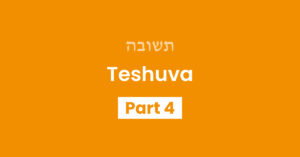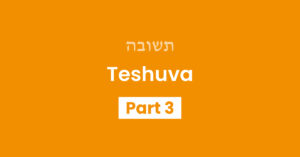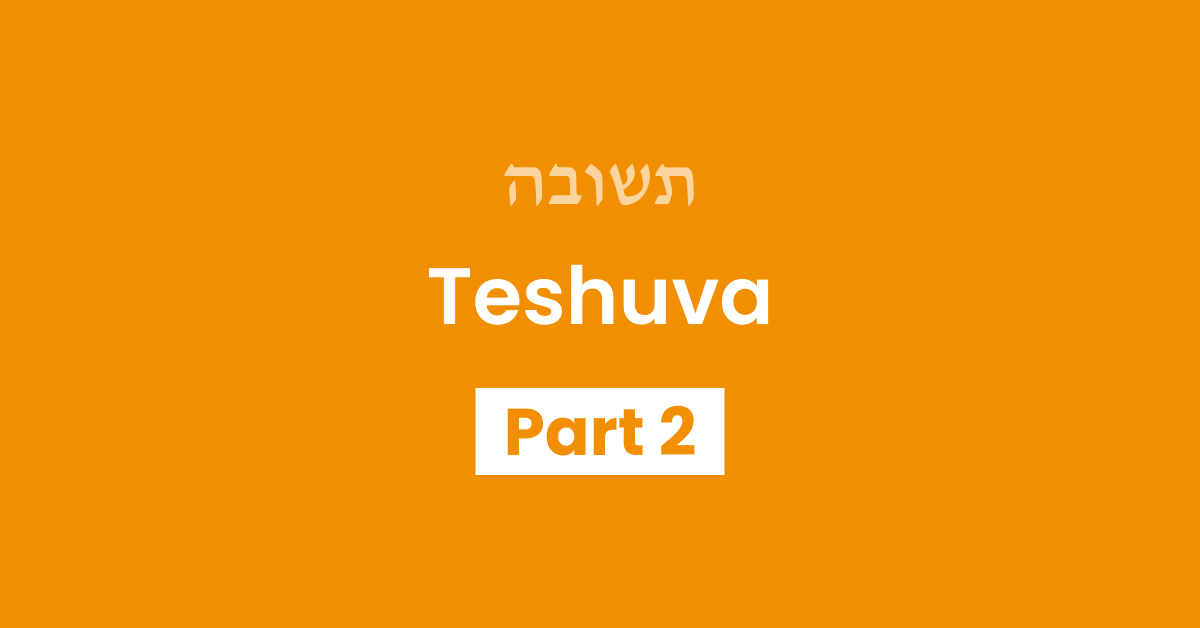We are about to enter the month of Elul, one of the most powerful times of the year. Beginning on Rosh Chodesh (this Tuesday and Wednesday), we will blow the shofar every day in shul – a practice that is meant to wake us up to do Teshuva.1
When we hear the shofar blasts, it’s easy to feel shaken up inside… but all too often, the echoes of the shofar only last for a brief moment. The shofar’s wakeup call quickly fades into the background, and we settle back into our regular daily routine.
Meanwhile, the clock is ticking, and Rosh Hashana – our awesome Day of Judgment – is fast approaching! What can we do to prepare for this Yom HaDin? How can we bring the wakeup call of the shofar into our daily actions and awareness?
This month, we will be focusing on some thoughts related to Elul, Teshuva, and preparing for our upcoming Day of Judgment.
An Endless Pursuit of Pleasure
As many Sifrei Mussar write, the first step in doing Teshuva is called doing a “Cheshbon Hanefesh” – making an “accounting” of your soul. What does this mean?
Much as a regular accountant’s job is to keep track of how much money his business is gaining or losing, the goal of a Cheshbon Hanefesh is to make an accounting of how much our souls have been gaining or losing. We take stock of what’s coming in, and what’s going out – and see if our profits outweigh our losses.
While the goal of a business is to amass as much money as possible, the goal of the soul is very different. As the Mesilas Yesharim2 teaches, our souls were created with just one goal in mind: L’His’anag Al Hashem – to enjoy the pleasure of forging a deep, everlasting connection with Hashem.
Our souls were created with just one goal in mind: L’His’anag Al Hashem – to enjoy the pleasure of forging a deep, everlasting connection with Hashem.
We naturally feel our souls pulling in this direction whenever we feel the desire to “do the right thing” or whenever we feel sad or guilty if we do the wrong thing. But even though our souls know deep down that only following Torah and mitzvos will make it ultimately happy, the essential challenge of this world is that our soul gets confused and distracted by other, temporary pleasures. When it feels too hard to push ourselves to achieve the everlasting pleasure that comes from doing mitzvos, our souls turn to acquiring cheaper, counterfeit pleasures instead.
Instead of aiming to acquire the difficult – yet deeply satisfying – goal of holding back our tongues from saying lashon hara, we sometimes slip up and trade it in for the shorter, fleeting pleasure of making our friends laugh. Instead of aiming for the long-lasting happiness and satisfaction we will get from taking care of the bodies that Hashem entrusted into our hands, we are tempted to trade it in for the momentary, fleeting pleasure of a custard donut or sugary coffee.
Our soul is always driven toward attaining pleasure, but the question is just what type of pleasure it will be.
Our soul is always driven toward attaining pleasure, but the question is just what type of pleasure it will be.
As we go through life, we begin to realize that when we give in to a temptation to indulge in a temporary, fleeting pleasure, the pleasure doesn’t even last so long and then we are left with a bad taste in our mouths3. When we realize that we have exchanged an opportunity for earning eternal pleasure with the momentary fleeting pleasure we got from indulging in our desires, we are filled with deep regret.
This feeling of intense regret is called “Charata” and is the first step of Teshuva. As the Orchos Tzaddikim4 writes, “The first step in Teshuva is Charata… he should think to himself: What did I do?! How did I allow myself to become lax in controlling my yetzer hara, allowing it to indulge in a momentary pleasure? … How did I allow myself to trade in a great eternal world [Olam Haba] for pleasure in this tiny short-lived world? How did I forget that one day, my body will decompose, and I will be left only with my soul…?”
Weighing the Scales
We can now understand what it means to do a Cheshbon Hanefesh – take an “accounting” of our souls. It means looking at our actions and seeing whether each action is bringing us closer or farther from the goal that our souls are naturally striving to achieve. Our souls are naturally yearning to achieve the ultimate and everlasting pleasure of clinging to Hashem, so every action that we do must be measured against this yardstick.
Doing a Cheshbon HaNefesh means looking at our actions and seeing whether each action is bringing us closer or farther from the goal that our souls are naturally striving to achieve.
This “Cheshbon Hanefesh” can be done after-the-fact, or, even better – it can be done before we make our choices. Whenever we are faced with a decision – to get up for Shacharis on time or to stay in bed a few more minutes; to say that hurtful joke or to hold ourselves back – we can stop for a moment and “make an accounting”: Which choice will bring me more ultimate pleasure? Which choice will bring me closer to Hashem, my Source and my Creator, who loves me infinitely?
The more we train ourselves to think this way, the better we will be positioned to make the right choices and keep our souls happy. Although most of us probably already do this Cheshbon HaNefesh subconsciously, the more we bring it into the forefront of our consciousness, the more it will become ingrained in our decision-making process.
This week, let’s practice making a “Cheshbon HaNefesh” before or after we act – and hopefully this will help us make better choices that will bring us closer to Hashem and achieve the ultimate pleasure in Olam Haba which our souls are yearning for.
Sources: [1] Rambam Hilchos Teshuva 3:7; [2] Mesilas Yesharim: Chaper 1, also see Sefer HaChinuch Mitzvah 418 and Koheles Rabbah Chapter 6; [3] See Mishlei 14:12; [4] Orchos Tzaddikim: Shaar HaTeshuva
Your Challenge
Once a day, do a quick “Cheshbon HaNefesh” – calculate how much your soul will gain or lose from doing a particular action.
You can do this either before, or after making a decision.
Try to notice what is the momentary pleasure that you are being asked to give up, in exchange for the everlasting pleasure of connecting to Hashem.
FOR EXAMPLE:
- After checking your phone in the middle of davening, think to yourself: “What did I do?! I exchanged the everlasting pleasure of maintaing a strong connection with Hashem, with the momentary pleasure of satisfying my curiosity!”
- When you are tempted to eat a piece of food without first looking up the proper bracha, think to yourself: “I am going to choose to look up the proper bracha on this food because I value my everlasting connection to Hashem more than I value the momentary pleasure I will get by rushing to eat this food sooner.”
- After saying a hurtful comment to another person, think: “What did I do?! I exchanged the everlasting pleasure of being a sensitive person with the momentary pleasure of feeling like I’m so smart for thinking of a good come-back!”
Torah Questions
- Which person said: “My sin is too great to bear”? (Bereishis 4:13)
- About which king is it said: “There was never any other king before or after him who did teshuva as well as he did”? (Melachim II 23:25)
- According to Pirkei Avos 2:10, when should a person do teshuva?
- According to Rabbi Meir in the Gemara (Yoma 86b), what happens when an individual person does teshuva?
- According to the Gemara (Brachos 19a), if you see a certain type of person doing a sin at night, you should forget about it by the next day because he certainly did teshuva by the next. What term is used to describe this special type of person?
Questions to Ponder
- The Gemara (Brachos 34b) says that in a certain way, people who do teshuva are greater than people who have been perfectly righteous their whole life. How cold this be?
- The Gemara (Brachos 7a) says that “one chastisement in the heart of man is better than 100 lashes.” What do you think this Gemara is trying to tell us?
- A passage in Yeshaya (65:6-8) states: “The evil person should forsake his [evil] ways… and return to Hashem, and Hashem will have mercy on him… For My [Hashem’s] thoughts are not like your [human] thoughts, and your [human] ways are not like My ways.” What does the last part of the passuk have to do with anything? What is the passuk trying to tell us by saying that Hashem’s thoughts and ways are different from ours – and what does this have to do with teshuva?





